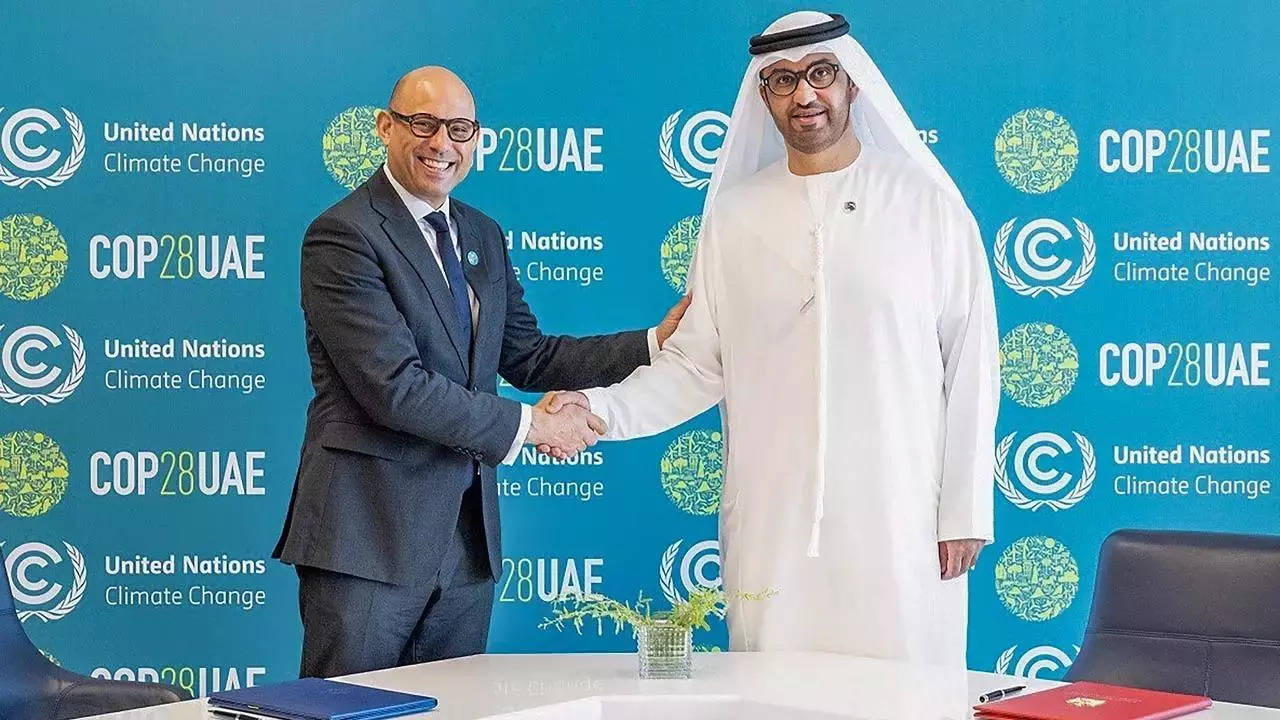NEW DELHI: Theme of India’s G20 presidency — ‘Vasudhaiva Kutumbakam‘: One Earth,One Family, One Future — will also be the theme of India’s pavilion at 28th session of the UN climate change conference (COP28) in Dubai, UAE during November 30-December 12. The environment ministry has decided to use the same theme for COP28 pavilion to showcase the country’s efforts to instill a sense of unanimity for addressing the global challenge of climate change.
The ministry – the focal point for climate change cooperation and global negotiations – accordingly proposes to hire an agency for the work of conceptualization and management of India pavilion.
“The objective of the proposed theme-based pavilion is to highlight various ongoing initiatives/ activities of the government as well as its strategies for mitigation and adaptation measures to tackle climate change,” said an official who will be part of the negotiating team during COP28.
“The concept and design of the Indian Pavilion to be set up at COP28 shall offer a unique opportunity to showcase India’s positive actions on climate change digitally as well as through exhibits and in the nature of panel discussions, presentations, conferences, interviews, press conference, short movies, documentaries, lectures, demonstrations, showcasing of exhibits, etc.,” said an official note on the proposed pavilion.
The theme “vasudhaiva Kutumbakam” is drawn from the ancient Sanskrit text of the Maha Upanishad. lt affirms the value of all life – human, animal, plant, and microorganisms – and their interconnectedness on the planet Earth and in the wider universe.
“The intent is to convey a message for just and equitable growth for all in the world, in a sustainable, holistic, responsible, and inclusive manner. It also reflects India’s approach of living in harmony with the surrounding ecosystem,” said the note, released last week.
The theme of India’s pavilion will not just be in sync with the G20 theme but it will also reflect continuity of the country’s approach adopted at climate negotiations where India has consistently been pitching for how change in lifestyle and consumption pattern could prove to be an important tool in the global fight against climate change.
The approach was also reflected in the country’s pavilion at COP27 in Sharm el-Sheikh, Egypt last year where ‘LiFE’ – lifestyle for environment – was the theme, showcasing how Indian civilizations have practised and led sustainable lifestyles with eco-friendly habits and practices being rooted in the daily life showing respect for the natural environment.
The ministry – the focal point for climate change cooperation and global negotiations – accordingly proposes to hire an agency for the work of conceptualization and management of India pavilion.
“The objective of the proposed theme-based pavilion is to highlight various ongoing initiatives/ activities of the government as well as its strategies for mitigation and adaptation measures to tackle climate change,” said an official who will be part of the negotiating team during COP28.
“The concept and design of the Indian Pavilion to be set up at COP28 shall offer a unique opportunity to showcase India’s positive actions on climate change digitally as well as through exhibits and in the nature of panel discussions, presentations, conferences, interviews, press conference, short movies, documentaries, lectures, demonstrations, showcasing of exhibits, etc.,” said an official note on the proposed pavilion.
The theme “vasudhaiva Kutumbakam” is drawn from the ancient Sanskrit text of the Maha Upanishad. lt affirms the value of all life – human, animal, plant, and microorganisms – and their interconnectedness on the planet Earth and in the wider universe.
“The intent is to convey a message for just and equitable growth for all in the world, in a sustainable, holistic, responsible, and inclusive manner. It also reflects India’s approach of living in harmony with the surrounding ecosystem,” said the note, released last week.
The theme of India’s pavilion will not just be in sync with the G20 theme but it will also reflect continuity of the country’s approach adopted at climate negotiations where India has consistently been pitching for how change in lifestyle and consumption pattern could prove to be an important tool in the global fight against climate change.
The approach was also reflected in the country’s pavilion at COP27 in Sharm el-Sheikh, Egypt last year where ‘LiFE’ – lifestyle for environment – was the theme, showcasing how Indian civilizations have practised and led sustainable lifestyles with eco-friendly habits and practices being rooted in the daily life showing respect for the natural environment.
timesofindia.indiatimes.com
Source link











